There's one figure that any cost-conscious motorist wants to know about their car: miles per gallon (MPG).
This figure – which measures the fuel efficiency of a vehicle – allows drivers to know how many miles their car can travel per gallon of fuel (either petrol or diesel).
Most people will hunt for models with the highest MPG figures possible because it will keep running costs low and reduce the number of times they need to fill up.

But as the nation's car parc gradually transitions to EVs – there are already more than a million on UK roads – MPG is becoming less and less relevant as a new figure takes over: miles per kWh.
So, what is miles/kWh and how do we calculate it? Here's our guide to working out economical an EV is.
Is miles/kWh important to know?
Despite 31 per cent of British drivers considering an EV as their next car, as many two thirds admit to not understanding the fuel efficiency of an electric car, research from Carwow shows.
And almost four in five have no idea how to calculate miles per kWh for an EV.
How do you calculate miles/kWh?
Any EV you're buying will state the car's battery size in kWh on the specification information and it will state the range figure.
The amount of energy stored in the EV's cells is measured in kilowatt hours.
KWh:
Like the size of an engine, the size of the battery differs from EV to EV. A Vauxhall Corsa Electric, for instance, has a 48kWh battery, while a larger SUV such as a BMW iX can have a battery almost double that – 105kWh.
The kWh figure is a 'net' capacity figure because manufacturers keep some battery power in reserve to protect the cells, so make sure this is the figure you use for the calculation rather than the 'gross' number.
Range:
The range figure in the specifications will usually have the letters WLTP (World Harmonised Light Vehicle Test Procedure), which represents the real-world range test all new EVs are required to take.
There's usually more than one listed so use the 'combined' range figure.
Calculation: Divide the combined range figure by the usable (net) battery size to get the mile/kWh of your EV

What is 'good' miles/kWh for an EV?
Ian Reid, of Carwow, says: 'EVs are becoming more efficient as battery technology improves, which means miles/kWh figures are climbing upwards all the time.
'Lighter EVs are able to squeeze more miles out of each kWh as their motors don't have to work as hard.
'However, bigger EVs tend to have more batteries which is why they offer longer ranges.'
Generally, most new electric cars will have a figure of more than 4 miles/kWh so this should be your benchmark, but expect older, heavier large SUV EVs such as a Mercedes EQC to only manage 2.89 miles/kWh.
Currently the most efficient EV in Carwow's directory is the Tesla Model 3, which has a figure of 5.08 miles/kWh.
Compared to a smaller and lighter Fiat 500e with a 4.95 miles/kWh return, the Model 3 is particularly good.

How can you improve an EV's miles/kWh?
Eeking out the miles/kWh for an EV is similar to stretching out the MPG of a petrol or diesel car – it comes down to how efficiently you drive.
Reid suggests modifying your driving to maximise the miles: 'Harsh acceleration and braking affect the battery range, so try to be smoother and anticipate the road ahead.
'Also, choose the regenerative braking programme so the energy you use is not wasted when you slow down.'
Regenerative braking captures the energy that would usually be lost during braking and is used to recharge the vehicle's battery instead.
Another tip is to pick a more economical route: 'Navigation apps like Google Maps offer an 'Eco' option which may take a few minutes longer but will be shorter routes and driving at lower speeds.
'The extra time could well be offset by not having to stop for a top up charge', Reid says.













